Course:ASIA325/2023/Victims of the era: Love after Love (2020)
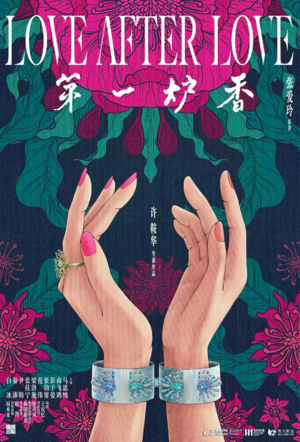
Group Members' Contributions
D Z: Section 2.1、3、4、5.1、6.1.3
Y L: Section 5.2、7.2、8
Z J: Section 2.2、2.3、5.3、6.1.1、6.1.2、6.2、7.1
Introduction
Background Info
The film, Love after Love, is based on the novella of the same name by Eileen Chang. It is a romantic drama directed by Ann Hui, written by Wang Anyi and starring Ma Sichun, Yu Feihong, Peng Yuyan and Zhang Junning. The running time is 2 hours and 24 minutes. The film was released in mainland China on October 22, 2021 and Hong Kong, China on November 25, 2021.
Synopsis
The film tells a story about the growth life upon the female protagonist Ge Weilong. She was appeared as an innocent but strong girl in the beginning, unfortunately, she had to round her personality to serve for her aunt Mrs Liang’s interests in order to get financial support for the rest of her education time. The rich life made Ge Weilong to question herself for the spiritual goal that she worked for originally. In the face of the attractiveness, she ignored the light side of self-consciousness. The male protagonist Qiao Qiqiao stepped into her life, Ge fell in love with him. Everything happened after then was the mutual and profitable use between characters. Nothing got resolved at the end, the darkness resumed on from era to era.
Page focus
This Wiki page will guide you to learn about other literature scholars’ reviews on the story’s root behind, thematic idea and filing strategies of a specific scene. Moreover, this page also included comparative analysis with the other film called New Women. Audiences could find endless difficulties faced by every passing-by era, which made ordinary people suffered from.
Stories Behind the Film
The film is director Ann Hui's third remake of Eileen Chang's novel, after Love in a Falling City and Eighteen Springs. Interestingly, Ann Hui's birthday was the day after filming began. In a special section on behind-the-scenes creation released for the release of the movie, director Ann Hui showed the strength of the behind-the-scenes cast by saying, "They have all won Oscars," when asked, "What do the original team have in common?"[1] The film is written by Wang Anyi, director of photography by Du Kefeng, costume and styling by Megumi Wada, art director by Zhao Hai, sound director by Du Duzhi and editing director by Kuang Zhongliang. Facing the sudden situation on the scene, director of photography Du Kefeng said: "Technical problems, give me a minute." He used his own excellent technical ability and high standards of creation, let the film show a unique aesthetic meaning. Emmy Wada, an Academy Award winner for best costume design, even uses her own collection of out-of-print fabrics and accessories to tailor her costumes to match the temperament of the actor and character.[2]
Histories of the Film’s Reception
On the film review websites, Love after Love has the lowest public ratings of any of Ms. Ann Hui's films. On the IMDb (Internet Movie Database), it is rated 5.3 out of 10.[3] On the Chinese review website, Dou ban Movie, it is rated 5 out of 10 only.[4] Ann Hui's this film has received mixed reviews. In terms of props, scenes, composition and music, the film is far beyond the normal level. It tries to be close to the original work as much as possible and strives to restore the vivid Hong Kong story created by Eileen Chang, which is also praised by the public. The casting of Mrs. Liang was also praised by the public, while criticism was directed at the casting controversy, the performances of Ma Sichun and Eddie Peng, and the storyline. The film to Ge Weilong and aunt emotional game and with Qiao Qiqiao love story become the narrative of the two pillars.
In Eileen Chang's novel, Ge Weilong's initial state is immature but not passive. Her parents leave Hong Kong, but she voluntarily stays behind to seek help from her aunt. From the very beginning, she knows that she is walking a tightrope, trying to find a future by delicately balancing fame and fortune. But in the movie, compared with the book, the game between the women for the future and even the lewdness disappear. Geweilong became a naive female college student, several female supporting roles also appear "righteous".[5] Because of this, the film loses the real heart of Eileen Chang's novel. If there is no step by step franchise, the audience will not be able to experience Ge Weilong and other women's narrow living space and helplessness, but also can not understand the root cause of her eventual fall, which is also the reason why it is criticized by the audience.
The story of the film takes place in Hong Kong during the colonial period. Ge Weilong, a young Shanghai girl, goes to her aunt, Mrs. Liang. Under the temptation of love, desire and things, she gradually falls into ruin, and human nature experiences a heart-stirring tragic and profound transformation. This kind of story will not be out of date in 2020 when the movie is released. “Love after love” shows respect for the original, but loses all the virtues of Eileen Chang's novel, even though it is faithful to the original. [6]Eileen Chang's original novel holds a pivotal position in the hearts of fans, but the film just basically copies the dialogue, and does not restore the psychological description, scene description, and exquisite metaphor that the novel has surprised readers. The story is " Love after love ", but it is not Eileen Chang's "Love after love", can only say that it is partly similar to the original feeling. The straight story is too straightforward and lacks the precise and playful depiction of the original. These parts, which represent the true connotation of Eileen Chang's novels and her attitude towards life, have not been created. Then there are the big casting problems. Ma Sichun, who is slightly fat from beginning to end, did not reflect the key transformation image of Geveron; Eddie Peng doesn't fit Joe's mixed-race image; Yin Fang plays Lu Zhaolin's students taste , but not like Hong Kong student. The whole film does not show any taste of Hong Kong, Shanghai, colonial, orientalism, it is difficult to deeply show Eileen Chang's " Love after love ".
Scholarly Literature Review
Reading Eileen Chang and Filming Hong Kong-An interview with Ann Hui on Love After Love[7]
The article "Reading Eileen Chang and Filming Hong Kong-An interview with Ann Hui on Love After Love" by Tom Ue is an interview with director Ann Hui about her latest film, "Love After Love," which is based on a novel by Eileen Chang. And it premiered at the Venice Film Festival, where Hui was honored as the first female director to receive the Career Golden Lion. The interview discusses how Ann Hui adapted the Elieen Chang’s noval and the theme of the film Ann Hui wants to show.
The story is talking about Ge Weilong (Sichun Ma) is playing hooky and visits her Aunt Liang (Faye Yu), who had angered her father when she refused to marry the man selected for her and when she became the concubine of a wealthy tycoon. Aunt Liang offers Weilong a home, but it is not as it seems, as she wears an emerald spider the size of a fingernail. Weilong is sensitive of such dynamics and compares her aunt's home to an ancient imperial tomb, feeling like one of those young students in Pu Song ling’s old ghost stories. And finally Weilong falls in love with Qiao Qiqiao (Eddie Peng). Ann Hui discusses her procedure, Eileen Chang's fiction, and what attracts her to this story.
Also, Ann Hui talks about he current state of the Hong Kong film industry. Ann Hui has worked with many legends, including Paul Chun, Deanie Ip, Chow Yun- fat, and Andy Lau, and cast her actors after the script is finished. Her favourite collaboration is with Chow Yun-fat and Josephine Siao, who were better than expected and easy to work with.
Ann Hui's adaptation of Eileen Chang's "Aloeswood Incense: The First Brazier" resonates with readers and viewers today due to its theme of unrequited love and the depiction of a mixed society. The film follows Chang's story closely and follows her detachment from Weilong's actions. Christopher Doyle's cinematography is beautiful and captures people's change of expression. The novel includes new scenes, including Madame Liang's remembering her spouse's funeral and serving tea to his mother and wives, as well as Weilong's imagining Madame Liang in Shanghai. Wang Anyi's creations make us more sympathetic towards her, and Wong Anyi's idea of showing the aunt everywhere in Shanghai universalizes her fate and urges Weilong to feel that she has the same fate. Chang contrasts Hong Kong with Shanghai, both in terms of geography and in terms of people, and suggests that they are equally unpredictable and enigmatic. Mixed-race people in Hong Kong are often blamed for their behaviours, making it difficult to show the multiculturalism of the city.
The most important details in this text are the reasons why Weilong gives up so much for George, why George won't lie to Weilong, and why Madame Liang suggests to George that he can divorce Weilong when she can no longer support them. Eileen Chang's originality is that she stated Weilong did what she did know it would be a disaster, while George's behavior is ambiguous and may be the truth. Madame Liang most likely means it.
Ann Hui hopes not to return to Eileen Chang for another film. They also have not thought about making a film about the city's future.
A Tentative Study on the Samsara Fatalism in the Novels of Eileen Chang[8]
Huang suggests that Eileen Chang’s work associates samsara fatalism phenomenon with abnormal love. As he defines, Samsara means rotation/circulation that is used to describe continuous life and death in the six paths of heaven and man. Samsara fatalism experience could be understood as “the overlap of the same or similar fate between individuals”[8]. Elieen Chang associates these reincarnation with one’s struggle for money and results in abnormal love. Elieen Chang associates these reincarnation with one’s struggle for money and results in abnormal love. In her novels, characters, especially women, struggle with basic survival and experience life in stagnation. For example, in “Love After Love”, Ge Wei Long hoping to pursue education in Hong Kong. However, she experiences stagnation when basic survival needs hamper her from attaining spiritual fulfillment. When she finds that Qiao Qiqiao isn’t willing to commit to their relationship, she decides to go back to Shanghai. Nevertheless, the temptation for a materialistic lifestyle in HongKong lures her back. Ge Wei Long shares the similar fate with Aunt Liang; they both grasp on men for material security but never stand up in this patriarchal society. Though hoping to pursue education and attain spiritual fulfillment, Ge Wei Long had to give up on women’s lack of status in the society and the necessity to rely on men for a foothold. Similar to Ge, Aunt Liang heavily relies on heritage and Situ Xie for sustating the material life she has. The abnormal love between Ge Wei Long and Gerorge Qiao also highlights the struggle for women to gain economic status and the pursuit of free love.
Meaning-Making in the Untranslatability: A Translanguaging Analysis of the Film Love After Love[9]
In the article, Han mentioned that the film has one episode depicting the Chinese-Portuguese miscegenation dandy Qiao Qiqiao used Portuguese sonnet to allure Ge Weilong. Regardless of the English and Chinese subtitles, adding upon both protagonists’ behavioral reactions, and filming techniques, which conveyed deep aesthetic effects beyond visual display. The film designed Qiao spoke in a low and mild voice to depict an ambiguous environment that softened and heated their hidden love upon each other. Han highlighted the musicality of the sonnet pattern attributed more hidden meaning beyond the visualization of Qiao’s soft voices. From this sense, the magic was rooted from the original rhythm inside the poem that made untranslated language more erotic and joyful to Ge. Ge’s unintentional series of responding actions such as tilted her head, hugged her knees and listened for a while. Her responses definitely showed her interests and curiosity in Qiao’s words.
Han claimed that the filming techniques and significance of colors acted as either competitive or cooperative power with sounds. The camera switched between long shots and close-ups to immerse the love romantic feeling in an enlarged environment as the director intended to show audiences that Qiao and Ge’s eyes only contain each other and nothing else. Additionally, the movement of camera approaching was in a slow motion to indicate the gradual build-up of romance. Besides, the visualization displayed red rose, black suits, yellow cheongsam, green shawl as those objects constituted the ambiguous feelings that were typical symbols for appointments between young and lively couples. When the poem recital stopped, the camera captured the closeup of Ge’s quarter-front facial expressions as we noticed that Ge moved her eyes away from Qiao to avoid deeper emotional communication through eye contact.
To conclude, author Han used translanguaging scene to mobilize the potential skills of audiences’ available sensory repertoires, which made them still feel the ambiguous love between two characters. By applying interwoven audiovisual signs, the poem itself lost the textual meaning. Instead, Eileen used intertextuality to extend the hypotext of the poem towards hypertext way. Audiences could do a presupposition as a thinking space foundation, which would facilitate us to understand the later plot.
Comparative Analysis
The following section will compare the similarities and differences between the film Love after Love directed by Ann Hui and New Women [10]directed by Cai Chusheng.
Similarities
Westernized colonial background
The historical background of the film New Woman that Wei Ming lived in was under capitalism and westernized modernity. Shanghai was a colonial territory in the film and there were a lot of westernized elements in aspects of actors’ dressing especially for upper-class people. Westernized modernity overthrew Confucianism and Familism, and females received advantages from the phase transformation from gender to sex. Females like Wei Ming and Ah Ying got chances to show their identity as equal counterparts with males. Wei Ming’s initial celebrity identity was resulted from the new-rise of women concept as they could show their independent spirit, educational performance and financial power. However, capitalism at the same time was also being introduced to Shanghai, which led the entire society more cared about economic growth. By applying the economic term into societal operation, then the society rank turned to whoever got more money power then who would be the leader. Upper class male generation definitely became the winner in that case and newly-rising female generation were not powerful enough to develop themselves financially. Therefore, Wei Ming was being drown herself in this capitalism and male dominance world.
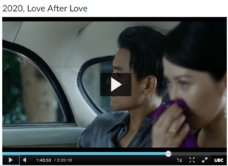
The historical time in Love after Love was in 1940s in Hong Kong. Upper-class people lived their life in a westernized way as the film first started with an alcohol party in Mistress Liang’s house. Though females were dressing in qipao look, the etiquette of their communication was in a western modernity look. Additionally, there were westernized army people also joined the party and the after-dinner dancing style was in a westernized look. Moreover, one scene from the film that Mistress Liang was secretly planned with Qiao Qiqiao on how could they use Ge’s sexual body for earning money and later let Qiao to get divorce with Ge. Mistress Liang mentioned that they charged Ge for adultery as the divorce reason, which shall punish Ge hardly and successfully. This was a still camera movement for a short duration as the camera focused on the conversation only. Moreover, the shot was being filmed in a deep depth of the field as the director intended to highlight both characters’ reactions. The collusion between Mistress Liang and Qiao Qiqiao became the major reason threw Ge into darkness. To sum up, ordinary people like Wei Ming and Ge Weilong experienced trauma from westernized world that impacted the pathway of their future, even the death outcome. The colonialized way of living enlarged the gap between two extremes side of population which lasted for about few decades.

Characters’ Initial Intention of entering the money world

In the film New Women, Wei Ming was a newly-rising female writer who lived under male dominance world. In the scene above, the camera gave a detailed close-up shot to the female doll. And in the next shot, while Wei Ming spoke the behind meaning of the doll “The women who cannot topple over”, she looked confident and happy with true smiles appeared on her face. Therefore, Wei Ming was a strong and self-dependent women in the beginning of the plot since she was positive towards her life slogan. However, celebrities in Republican era got famous due to their strong interpersonal background with upper-class people. Thus, Wei Ming first refused Dr Wang’s invitation, but she accepted at the end since she really needed valuable social relationships to achieve her professional success.
In the second image, Dr Wang was in charge of their conversations, whereas Wei Ming looked reluctantly in responding Dr. Wang's toast. Additionally, Dr Wang wore a black suit compared to Wei Ming’s light-colored cheongsam. Moreover, the camera filmed under a low-key lighting, which coincided with Dr Wang’s dark suit, that demonstrated Wei Ming stepped into this dirty and blurry money world without any preparedness.
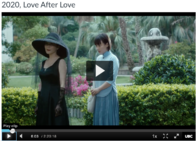
Both Ge Weilong and Wei Ming were similar in terms of their original intention for accessing upper class was to facilitate their own life duties. Those intensive social connections would earn Wei Ming a smooth publishing progress, that would assist her professional self-sufficiency goal. In the beginning of the film Love after Love, Ge Weilong was appeared as a debased and naïve high school student when she first met her aunt (Mrs Liang). In the shot below, Mrs Liang was stood before Ge and Mrs Liang did not looked at Ge when she responded Ge. Thus, the front position and casual responding attitude for Mrs Liang towards Ge already conveyed to audiences who was the important character. Additionally, Mrs Liang was dressed up in a fancy look that we could hardly capture the details of her facial look. The upper-class dress code made audiences thought that they could ever reach this god-looking female. Compared with Ge’s typical school uniform, she bowed her head and looked at the floor while talking, especially the full look shot given to Ge made audiences clearly saw her entire body was in a pressure look. Think about on Wei Ming’s reluctant appearance as both Wei and Ge were uncomfortable in this rich world. And both of them chose to adapt and respond back to the upper-class people since they need financial or interpersonal dependence from richness. To sum up, Wei Ming and Ge Weilong were “outsiders” in this rich world, but they all made the same decision as to debase or to perform themselves as the way what rich people would like. They also had similar initial intention was to use the relationships that they may develop with upper-class as a stepladder for their personal growth.
Repression of women's social role in patriarchal society
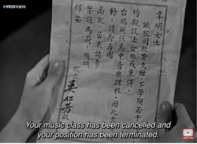
In the film New Women, Wei Ming left her daughter to her sister and went to Shanghai alone to find her way out. She went to a private school to be a teacher in order to survive. Dr. Wang is Wei Ming's colleague. Although he is married, he is often very disrespectful to beautiful Wei Ming, which makes Wei Ming feel disgusted and spurned. In the scene, there is a close-up shot for the dismissal letter showing that Dr. Wang tricks Weiming to get fired from the school after Weiming reject his advances. This plot actually reflects the phenomenon that women were oppressed when they wanted to work independently under the background of the patriarchal society at that time, indicating the negation and contempt for the value of women under the patriarchal society.
In the film Love after Love, Mrs. Liang's upper-class life began after she married Mr.Liang, who is a wealthy old businessman, and came to Hong Kong. After Mr.Liang death, she lived off her inheritance and the house he left her. In the scene, Mrs. Liang was making fun of herself for marrying a rich businessman by using a full shot.The audience can clearly see her lying there slouching and making funny remarks about herself. She used her youth and beauty in exchange for money, in Mrs. Liang's view is correct, she married a rich businessman is indeed voluntary,this is decided by the social environment. In the traditional social environment, women have a low status and do not have the ability or conditions to earn a living by themselves.
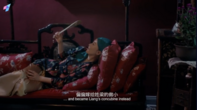
Therefore, both films shows the repression of women's social role in patriarchal society. From the two films, we can feel two different classes of female characters, but no matter which class of women, they are not completely free, they are denied and despised in the society, which is the complete oppression of women in the patriarchal society.
Differences
Cross-cutting: Lasting time for each of the intercut scene
The strategy of cross-cutting used in New Women, which the director continually changing the scenes between how working-class females were actively working hard to make changes and how upper-class people were dancing in an alcohol party. Additionally, the filming frame was in a circle sized view that constrained the focus for audiences only on the central interest comparison based on what the film intended to compare for. Moreover, after every time node, there would be a clock showing the pass-by time. The time effects here conveyed that how long for upper-class enjoyed their beautiful night and how hardly that working class people spent for work without any slackness. The lasting time for each of intercut scene only lasted for few seconds and the time was being speed up. This strategy matched the intention that our director Cai Chusheng’s social realism cinema style. Throughout the quick flash of scenes as we compare different classes of people, Cai intended to advocate the revolution need to come for saving those honest and hard-working population.
This cross-cutting strategy was being used in the film Love after Love. Different from the fast of intercut scenes happened in New Women, instead, Ann Hui here lasted her intercut scenes a bit longer for each of scene depiction. This longer time filming encouraged audiences to really engage their mind in to one scene so that we probably could substitute ourselves into characters’ mind. The film constantly switched between scenes of rich people’s night party and Ge Weilong’s self-entertained night. Between 13:24-13:37, Ge was quietly eating her simple dinner alone. The mise-en-scene was being settled in this dark bluish bedroom with low-key lighting. This 14-seconds scene depicted a deserted and tense atmosphere in Ge’s guest room. Audiences set their mood in cold, probably they would further generate sympathy towards Ge’s poor experiences in her aunt’s house. Suddenly, the scene was being switched to browned roast duck, followed by a master shot with a long take. This shot between 13:38-14:00, at least on the surface the atmosphere looked harmonious and warm. Audiences would extract themselves from boring feelings and learned in this happy mood. Later between 14:01-14:29, at the same time and space with rich people’s alcohol night, Ge’s face turned to be surprised as she discovered a lot of well-designed cheongsams in the clot. Then, between 14:30-15:26, back to rich people’s scene, they followed the diegetic music to dance with a peaceful and soft mood. Therefore, audiences could compare different people’s different mindsets as they felt joyful for different activities. Audiences could pretend themselves in first-person point of view to better understand the large gap between different classes. Victims of the era was being generated through daily comparisons, Ge’s low self-perception and low self-satisfaction already foreshadowed her sad ending.
Tragedy for Wei Ming and Ge Weilong
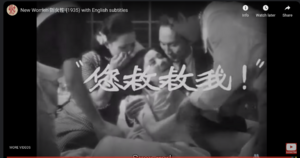
Cai Chusheng gave the protagonist Wei Ming a suicidal ending. Wei Ming’s physical body was being killed by slanderous newspapers and male domination. However, Wei Ming’s self-sufficiency was being saved back by her revenge goals after she saw massive negative comments about her professional and personal life that were being capitalized on newspapers. Upon her friends’ encourages, she planned to throw off individual concerns and persisted on her spirit “women who cannot topple over”. In the very end, though Wei Ming’s body was extremely weak but she actively begged the doctor for saving her life. A master shot took place as audiences could feel that everyone surrounding her were trying the best to help Wei Ming. The subtle warmth was being generated in this case, this tiny bit humanity protected the newly-rising power of being a new woman in this difficult era. Though Wei Ming’s celebrity reputation was in a complete downfall, whereas at least she continued to speak for female rights rather than serving as male dominance’s commodity. Therefore, Wei Ming’s spiritual aliveness perfectly matched with Cai Chusheng’s intention of advocating human rights for weak population under this unbalanced society structure. The tragedy from this sense only limited to Wei Ming’s body death, not attached any historical failure for females or other minorities.
However, Ge Weilong’s tragedy was resulted by her uncontrolled money desires that was uprooted in this dirty and rich world. She gradually lost her self-identity when her pure love relationship with Lu Zhaolin was being snatched away by her aunt. The first phase of Ge’s downfall would be all fantasies that she dreamed in the beginning became jokes in the face of reality. Due to the emotional hurt, she set her mood in darkness as she would never believe any pure and sentimental love. Later, Ge could not control her heart longing for love when she met Qiao Qiqiao, she was being attracted and cheated by his wheedle and handsome look. The second phase of Ge’s tragedy was her decision to go back to Shanghai as she intended to find the old self back. However, Ge could not ever stand her poor life again, her final decision of staying with her aunt was the turning point of her life direction. Ge was introspective about her situation and future life as she shall aware any outcome as she already learned from similar experiences happened on others. She was entangled between self-deception and self-evaluation of her inner morality. This inner contradiction was existed in her mind when she first received respectful services from low-class workers. Compare to Wei Ming’s spiritual self-sufficiency goal was in the end being saved back by herself, whereas Ge Weilong was being degenerated since her self-deception won over her morality boundary. Therefore, from spiritual aspect, Ge was dead since her luxury life was built on money desire, rather than a clear life goal.
The display of female characterization types
In the film New Women, there were various characterization types being depicted as either positive or negative models to assist the progressive plot. In the beginning scene, when Wei Ming asked Zhang Xiuzhen for her current name, she thought for a while and responded that just called her “Mrs Wang”. And later when Zhang Xiuzhen doubted Mr Wang’s love unloyalty, she ended up recovered her feelings since Mr wang promised a new car for her. Throughout the entire film, whenever the camera filmed Zhang Xiuzhen, then there must be her interaction with Dr Wang. To explain alternatively, Zhang Xiuzhen’s fate was relying on how Dr Wang treated her with enough money. Compared with other characters, Li Ahying was a female hero that she portrayed the positive model of being a new woman. Wei Ming was a middle type of character, she worked for her goal but with sensitive mood. Therefore, the director’s intention of using various types of female characters as typical models throughout the Republican era. Audiences could better understand their different endings or importance that carried the theme being a self-dependent new woman.
However, in the film Love after Love, Ge Weilong was possibly one of the rare and positive female characters in the beginning. Audiences could also claim that Nier and Ji Jie were the other two characters who were being classified as middle type. However, in the end, almost all characters were turned to the negative look that they only cared about money profit without taking humanity or morality as considerations.
To shortly conclude this point, female characterization was stable in the film New women, whereas female characterization in the film Love after Love was rounded to the same at the end. Though the historical time were similar for two films, characters ended up with completely different mindsets towards the similar societal darkness. One reason was there were different small friendship circles around Wei Ming and Ge Weilong, which internally influenced their beliefs.
Alternative Interpretation
Scene 1 (1:29:54-1:30:39) Ge Weilong was robbed on board
After Ge Weilong boarded the ship back to Shanghai, the passenger behind her looked in a hurry that he even knocked off Ge's package and ran away without making an apologize. Ge was stuck in a moment and was helplessly walking down the stairs with the handrail. Before she reached to her package, there were two other people ran over to grab the valuables in her package. The entire scene was being filmed under low-key lighting, which meant that audiences were only accessible to characters’ interactions but not in details. To explain in an alternative way, though audiences could feel the spooky atmosphere, whereas the specific filming setting was still blurry to them. Additionally, the camera only did minimal movement and kept the entire filming at the same level. As audiences notice that when Ge came downstairs to pick her package, the filming angle then turned into a high-angle shot. Thus, the whole snatch scene made characters seemed small and powerless. The significance here was that ordinary people exposed the selfishness of human nature in trouble times. Audiences should at least be aware that Ge’s poor looking demonstrated that she was consciously understood that she lost the original and naïve self in this money dominance world. Another extensive meaning was that the distortion of human nature in the whole environment has caused people to only pay attention to money interests, and lived in a state of walking dead without real personality.
Scene 2 (1:34:30-1:36:00) George Qiao's conversation with his father
In the scene when Qiao Qiqiao just came back from his mother’s grave, and ran into his father ordering the servants to let go of his loving pet. He wanted his pet back but was called a “spoiled brat” by his father, and lost his pet. While many are arguing that Qiao Qiqiao’s mixed race identity is representative in the film under Hong Kong’s colonial history background, Qiao Qiqiao is also one of the victims who suffers from the patriarchal society.
The weather was sunny and bright in the scene, just like on the face of it, Qiao Qiqiao is a wayward boy born in a family with a rich material life, who does not need to worry about making a living. In fact, his mother was not favored by his father, and passed away when he was young. He grew up in a big family with many step mothers. In the male dominated society, he was not favored by his father because of his mother, in spite of him being male. The absence of his mother’s company and father’s love in childhood led him to lack of security in the grown-up period. In the film, he has relationships with multiple women to fulfill self-realization and seek comfort in a way.
His identity not only reflects Hong Kong’s cultural mix, it also embodies his emotional struggle. On one hand, he tries to fight with his father to speak for his dead mother; on the other hand, he wants to be approved by his father. In this scene, he calls mother three times in a row when his father scolds him for mentioning his mother, but later apologizes to ask for father’s forgiveness. However, he was left alone in the yard and his pet was freed. To some extent, the way Qiao Qiqiao’s father treats his pet is similar to the way his father treats him. Given that Qiao Qiqiao’s father shows no care towards George, not only the female character’s fate is determined by male in the family, the offspring’s life of the female will also be altered. From reflecting on his big family to the whole society, people like Ge Weilong and Aunt Liang are not the only victims who have doomed destiny, George and many other children of the oppressed women also suffer from the patriarchal social system.
Conclusion
The film Love after Love is adapted from mid-20 century Chinese novelist Eileen Chang’s short story Aloeswood Incense: The First Brazier. There are controversial voices about the movie, and receiving a below average rating in both local and overseas markets. While the audiences hold different opinions towards the film, it is undeniable that with Christopher Doyle’s excellent camerawork, talented actors and Sakamoto Ryuichi’s music, Ann Hui has presented the story vividly on the screen. Moreover, our group found that Ann Hui has revealed the social inequality between genders under capitalism and westernized Hong Kong from a female director’s perspective, more particularly, through showing the frustration and suffering Weilong had in her love life. This is also why we do recommend this film. Overall, this film not only reflects realism under colonial period, it also depicts the tragedy of an era in colonial period of Hong Kong under capitalism.
References
</references>
- ↑ "《第一炉香》幕后创作特辑". 1905电影网.
- ↑ "《第一炉香》发布幕后创作特辑 预售开启引期待". 新浪.
- ↑ "第一爐香". IMDB.
- ↑ "第一炉香 (2020)". 豆瓣电影.
- ↑ "热评|豪华的"第一炉香",为什么不香了". 人民网. 2021-10-28.
- ↑ "《第一炉香》的问题:温吞且徒劳的致敬". 澎湃网. 2021-10-27.
- ↑ UE, TOM (01 Dec 2021). "Reading Eileen Chang and Filming Hong Kong-An interview with Ann Hui on Love After Love". Intellectdiscover. 19: 99–103. Check date values in:
|date=(help) - ↑ 8.0 8.1 Huang, Chuan (Oct 2022). "A Tentative Study on the Samsara Fatalism in the Novels of Eileen Chang". International Journal of Education and Humanities. 5: 151–3.
- ↑ Han, Lili (September 2022). "Meaning-Making in the Untranslatability: A Translanguaging Analysis of the Film Love After Love". Theory and Practice in Language Studies. 12: 1783–1789.
- ↑ Cai, Chusheng (Apr 17 2019). "New Women". Youtube. Retrieved Mar 31 2023. Check date values in:
|access-date=, |date=(help)